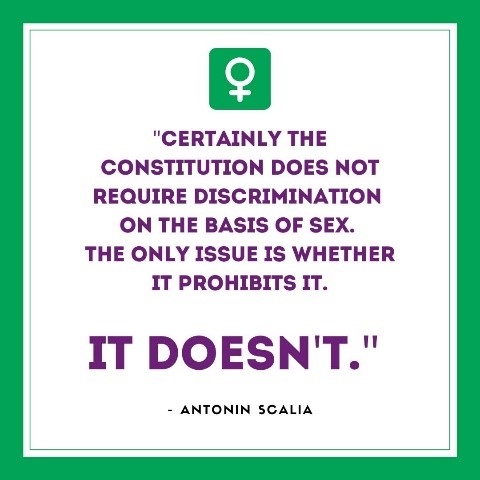Women's Equality and Ending Sexual Violence
Content Warning: This blog discusses sexual violence and assault.
Over the years, the United States has made significant social and legal advancements in creating a more equitable society. However, women, nonbinary, and transgender individuals continue to endure gender discrimination in many forms, including high rates of sexual violence. Despite various myths, sexual violence is not an isolated incident or a moment of uncontrollable anger. At its core, sexual violence is about power and control and is a symptom of a patriarchal, oppressive system.
April is Sexual Assault Awareness Month. As we stand with survivors and join advocates across the nation in raising awareness, we reflect on how building equality across all spheres is necessary for a world without sexual violence. Necessary actions include, but are not limited to, enshrining equality in our Constitution via the Equal Rights Amendment.
What is Sexual Violence?
An umbrella term, “sexual violence” is generally defined as any unwanted sexual activity that lacks clear and informed consent. While many people tend to characterize the term as something extreme or solely physical (ex. rape, intimate partner violence, sexual exploitation), sexual violence exists on a spectrum and includes verbal and non-physical behaviors. Sexual harassment, catcalling, rape jokes, stalking, and non-consensual sharing of sexual images are all examples of sexual violence.
Sexual violence has historically been interchangeable with terms like “gender-based violence” or “violence against women,” as statistics from the Rape, Abuse, & Incest National Network (RAINN) find that women and girls experience sexual violence at rates higher than men. 1 out of 6 women in the United States has “been the victim of attempted or completed rape” in their lifetime, with 90% of rape victims identifying as women. LGBTQ+ individuals are at an even higher risk, as they are nearly four times more likely to be victims of violence compared to straight individuals. However, it is important to recognize that sexual violence knows no boundaries. Sexual violence can happen to — or be committed by — anyone, regardless of race, class, sex, gender identity, or sexual orientation.
The Importance of Equal Rights in Ending Sexual Violence
For over 100 years, the League of Women Voters has been dedicated to empowering voters and defending democracy. As a nonpartisan organization, we recognize that we cannot have a fair, representative democracy without challenging and dismantling systems that minimize, silence, and discriminate against the voices of so many.

Our role in ending sexual violence mirrors our role in making democracy real for all of us — we must continue to uphold our values of equity and justice, demanding equal rights and protections for all. Without a democracy that honors the equality of all people regardless of sex, we cannot expect our society at large to do so.
That’s why enshrining equal rights in our Constitution is so important. To create a world where women and nonbinary folks can live safe and happy lives, we must make gender equality the law of the land.
To that end, now is the time to move the Equal Rights Amendment forward.
Why We Need the Equal Rights Amendment
First drafted in 1923, the Equal Rights Amendment (ERA) was created by suffragists Alice Paul and Crystal Eastman, who believed that gender equality needed to be a part of the Constitution. The ERA passed Congress in 1972, stating that: “Equality of rights under the law shall not be denied or abridged by the United States or by any State on account of sex.” Decades later, the amendment met the 38-state ratification requirement, with Virginia ratifying the ERA in January 2020.
Opponents question whether we really need the Equal Rights Amendment, arguing that women are doing just fine without it. However, we know that gender equality is far from a reality in the US. The wage gap, sexual harassment in the workplace, challenges to reproductive rights, and countless other forms of discrimination show that gender discrimination is a daily reality.
Tell Your Representatives to Support the ERA
Looking specifically at sexual violence, some may believe that laws like Title IX and the Violence Against Women Act (VAWA) demonstrate that we’ve responded sufficiently to sexual assault and other issues. However, these laws continue to face legal challenges, with modifications directly affecting survivors. While serving as Secretary of Education, Betsy DeVos implemented harmful Title IX regulations that narrowed the definition of sexual harassment and rolled back protections for survivors on college campuses. Additionally, VAWA, first enacted in 1994, has faced partisan barriers that slowed down the bill’s reauthorization process.

Even with the above laws in place, it is clear – we need the Equal Rights Amendment. While the ERA doesn’t focus on sexual violence, it sets a national standard for gender equality that will influence how our country perceives and responds to sexual assault and other issues.
What You Can Do
While pro-democracy and anti-sexual assault activists have pushed the needle forward in demanding equality, empowering survivors, and creating change, there is still work to be done. Here are a few ways you can act this April:
-
Sexual violence is preventable. Connect with your state’s agency to learn more about how you can support survivors in your community.
-
Participate in local and virtual Sexual Assault Awareness Month events.
-
Gender equality must be enshrined in the US Constitution. Contact your representatives and tell them that now is the time to take a stand.
-
If you or a loved one are in need of support, information, or a referral related to sexual violence, connect over phone or chat with hotlines like RAINN
The Latest from the League
On behalf of the LWVUS, we had a delegation of 19 attending the Commission at UN headquarters. We also organized a parallel event--Implementing Laws Preventing Violence against Women & Girls – Successfully, held March 5.
Women still lack equal rights in the U.S Constitution despite the significant legal and legislative advances that have been made in recent decades. It is not enough to treat the symptoms; we must address the root cause of inequality by amending the Constitution and finally adding the Equal Rights Amendment (ERA) to the Constitution.
LWVUS sent a letter to leadership in the U.S. House and Senate urging them to remove the ratification deadline on the Equal Rights Amendment.
Sign Up For Email
Keep up with the League. Receive emails to your inbox!
Donate to support our work
to empower voters and defend democracy.





